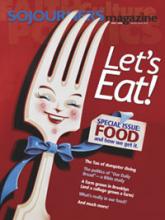In his landmark book Fast Food Nation, Eric Schlosser reported that, in a global marketing survey, McDonald’s Golden Arches proved to be a more widely recognized symbol than the Christian cross. The arches are second worldwide, after the Olympic rings. The cross comes in third.
Of all the changes that struck American culture in the last quarter of the 20th century, the explosive growth of the fast-food industry would have to count as one of the most destructive. That’s a big claim. We’re talking about a period of history that saw the advent of music videos, infomercials, and call-waiting. But I’ll stand by it.
Foodways are among the most essential defining elements of any culture; in the past few decades, ours have changed almost beyond recognition. Twenty-first century America has, in large part, left behind regionally grown, home-prepared food for globalized, pre-packaged, sweetened, and fatty convenience stuff. Just as we’ve surrendered control of our free time, and even our inner consciousness, to the TV and advertising industry, we’ve turned over responsibility for much of our daily sustenance to a few transnational marketing corporations.
We are what they sell us. And, in exchange, the lords of the fast-food empire have promised to free us from cooking, dishwashing, and (at least briefly) from complaining children. The consequences of this bargain are written across our strip-malled landscape, our low-wage economy, and our increasingly bloated bodies.
Read the Full Article
